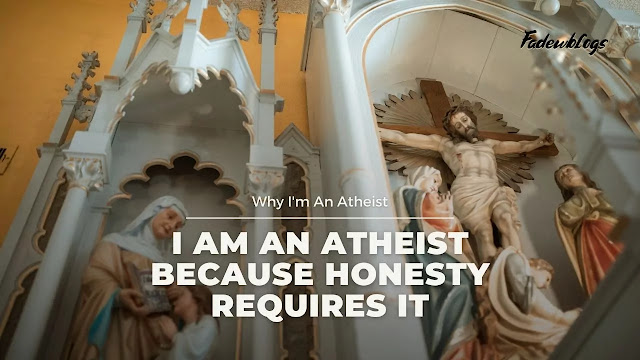Why I'm An Atheist
I was born in 1932 in a little Appalachian farm town with no electricity or paved streets. It was the Bible Belt, but my parents never went to church. They sent me briefly to rural Sunday schools because that’s what all children in my town did.
I remember laboriously trying to pray as a first-grader, but quickly abandoned it. Even then, it seemed like a pointless effort. I don’t think my Sunday-school attendance lasted past second grade. There were only thirteen students in my high school class.
After graduation, I moved to Charleston, West Virginia, and landed a newspaper job at the Charleston Daily Mail, thanks to my great-aunt, Jane Folden.
She was a proofreader and got me hired as an apprentice printer on Linotype machines in the old-style hot lead print shop.
However, I thought it would impress girls if I was a news reporter, so I worked without pay in the newsroom on my days off from the print shop. Soon after, our rival, The Charleston Gazette, gave me a reporter job.
In the newsroom, I found myself surrounded by bright newsmen who were worldly cynics eager for trustworthy knowledge.
They sneered at the stupidity of hillbilly preachers. Some reporters recruited me into a Great Books course at our public library, where we debated the world classics.
I was amazed by the dialogues of Socrates and other philosophical treatises which showed that the finest minds throughout history had struggled to fathom a purpose of life if any. That newspaper became my university.
My city editor was a brilliant, witty iconoclast in the mold of H.L. Mencken, the famed curmudgeon of the Baltimore Sun. He laughed at pomposity, especially that of backwoods religion.
One day I asked him, “You’re right that all this Bible-thumping is nonsense, but what is true? Why are we here? Why does the universe exist?
Is there a meaning to life? What answer can an honest person give?” He eyed me sharply and said, “You can say, ‘I don’t know.’” Bingo.
That rang a bell in my head that hasn’t stopped since. I became convinced that the only honest approach is to admit bafflement. I saw that it’s dishonest to claim to know supernatural things that nobody can know.
More on Why I'm An Atheist:
It’s untruthful to say you’re certain of gods, devils, heavens, hells, angels, demons, miracles, messiahs, prophecies, and other church dogmas when not a shred of real evidence exists.
In the 1950s, I joined the Charleston Unitarian Universalist congregation, which consisted mostly of Ph.D. chemists and Ph.D. college professors. It was largely an atheist assembly, which appealed to me. Once, a Unitarian friend told me I’m an agnostic, not an atheist, because I didn’t have an ultimate answer to the question of God’s existence.
I disagreed and rephrased the issue: “Do you think an invisible spirit rules the universe, listening to your thoughts, and will burn you forever because of them?” He replied, “Of course not.” So I said, “You see, we’re both atheists.” After consideration, he agreed.
In the second chapter of Ernest Hemingway’s A Farewell to Arms, some military officers taunt their unit’s naïve, young chaplain. “All thinking men are atheists,” a major tells him. To me, that’s a reliable maxim.
Since Ancient Greece, intelligent seekers have concluded that the supernatural claims of religion are hokum. Today’s skeptical thinkers can be proud to be part of this record of honest doubt.
━━━━━━━━━━━━━━━━━━━━━━━━━━━━━━━━━━━━━━━━━━━━━━━━━━━
 |
| Image: James Haught digging through files at the Gazette in the 1970s |
James A. Haught has been at the paper (now The Charleston Gazette-Mail) since 1951, except for a few months in 1959 when he was a press aide to Senator Robert Byrd. He still works full-time as editor emeritus.

